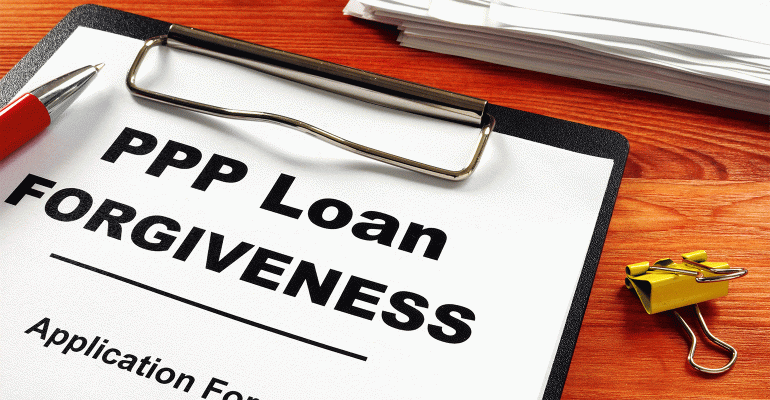Paycheck Protection Program recipients that “reasonably expect” their loans will be forgiven will not be able to deduct expenses associated with their loan this tax season, whether the business has applied for forgiveness or not, the U.S. Treasury Department and Internal Revenue Service confirmed on Wednesday. If their loan is not forgiven, then businesses can deduct the expenses when filing their taxes. The U.S. Treasury Department said that this would be considered “neither a tax benefit nor harm” because the business owner would not be paying anything out of pocket.
“Today’s guidance provides taxpayers with greater clarity and flexibility,” U.S. Treasury Secretary Steven Mnuchin said in a statement. “These provisions ensure that all small businesses receiving PPP loans are treated fairly, and we continue to encourage borrowers to file for loan forgiveness as quickly as possible.”
This clarification comes on the heels of the Small Business Administration releasing a simplified loan forgiveness program for borrowers of less than $50,000 in October. Generally, the SBA requires businesses to spend at least 60% of their PPP loan on payroll, otherwise they will not be eligible for forgiveness, but moving forward, business owners who borrowed less than $50,000 do not have to break down exactly how they are spending their loan, though the SBA can still request further information after a business applies for loan forgiveness.
Wednesday’s Treasury Department revenue ruling clears up a point of contention that had been raised by business owners wondering whether or not they should wait to apply for loan forgiveness.
“The whole idea of [the PPP loans] was to help businesses, give them money to stay afloat, and to keep employees on payroll,” Brian Smith, Director of Compliance for Restaurant Solutions Inc. told Restaurant Hospitality. “In normal operating procedures in past years, the incurring expenses from these expenses were deductible. [Previously], we thought businesses would get a double benefit: free money and they'd get to deduct expenses on their taxes.”
But Congress has pushed back on the decision from the U.S. Treasury Department, with the Senate Finance Committee releasing a statement saying that they "explicitly included language in the CARES Act" to ensure that businesses did not have to treat their loans as taxable income. The federal accounting and tax experts at CohnReznick professional services firm believe that the U.S. Treasury Department ruling will be challenged, and if Congress comes back and changes the Treasury Department's ruling, the decision would be retroactive, even for those that had already filed their taxes.
"This is going to be a big issue that they will most likely take up in — if not the lame duck Congress session — then in the session that comes after [during the new administration]," Brian Newman, tax partner at CohnReznick told Restaurant Hospitality.
Following the ruling, business owners that have received PPP loans have multiple paths they can take, CohnReznick's tax partners said. Either they could file as normally after the end of the year and not deduct expenses as instructed by the IRS, they could put their tax returns on extension to wait to see what the final ruling will be (for LLCs, Newman said, this would extend their tax deadline from March 15 to September 15), or they could take the position with disclosure, when they file their taxes, that expenses associated with the PPP loans are tax deductible and file accordingly.
"Taking that position could be challenged by the IRS, for tax payers that are considering this option," Stephanie O'Rourk, hospitality partner at CohnReznick said.
In addition to waiting for a final ruling on the interpretation of the PPP loan expenses deductibility, O'Rourk said that business owners need another relief package that is more grant-like in its intent than the original PPP loans, particularly so that business owners "are not pigeonholed" into spending the money only on paychecks, when there are numerous other expenses that Main Street businesses, including restaurants, have to take into account during the pandemic.
In a statement, the National Restaurant Association also believed that Congress needs to do more, and said that this ruling is further proof that the government needs to pass the Small Business Expense Protection Act, a bill introduced to the Senate in May that would amend the CARES Act to ensure that tax deductions on business expenses would not be affected by “exclusion of amounts related to loan forgiveness in response to COVID-19.”
“The guidance released by the Department of Treasury explicitly restricts a small business’ deductions for payroll and rent, made during the pandemic, for up to 24 weeks due to the use of a 10-week PPP loan,” Aaron Frazier, director of Health Care and Tax Policy at the National Restaurant Association told Restaurant Hospitality. “Restaurants cannot afford to lose up to 37% of their PPP loan amounts due to this unexpected restriction on standard tax deductions.”
Contact Joanna Fantozzi at [email protected]
Follow her on Twitter: @JoannaFantozzi





